一般将来时pep 六年级下册英语2
小升初语法复习-一般将来时(讲义)人教PEP版英语六年级下册
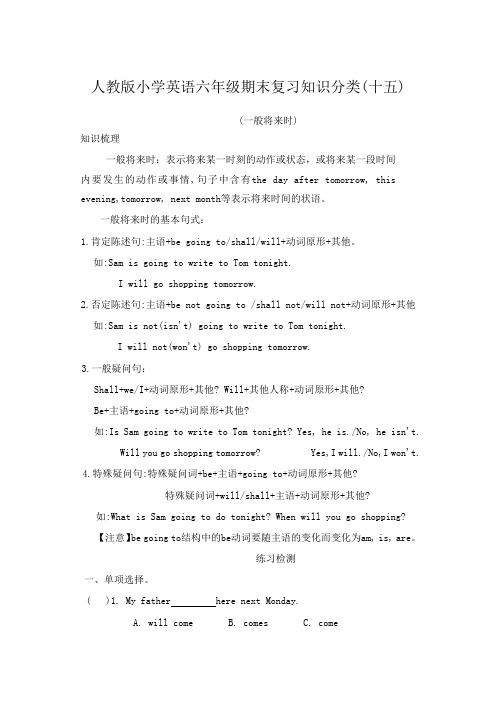
人教版小学英语六年级期末复习知识分类(十五)(一般将来时)知识梳理一般将来时:表示将来某一时刻的动作或状态,或将来某一段时间内要发生的动作或事情,句子中含有the day after tomorrow, this evening,tomorrow, next month等表示将来时间的状语。
一般将来时的基本句式:1.肯定陈述句:主语+be going to/shall/will+动词原形+其他。
如:Sam is going to write to Tom tonight.I will go shopping tomorrow.2.否定陈述句:主语+be not going to /shall not/will not+动词原形+其他如:Sam is not(isn't) going to write to Tom tonight.I will not(won't) go shopping tomorrow.3.一般疑问句:Shall+we/I+动词原形+其他? Will+其他人称+动词原形+其他?Be+主语+going to+动词原形+其他?如:Is Sam going to write to Tom tonight? Yes, he is./No, he isn't.Will you go shopping tomorrow? Yes,I will./No,I won't.4.特殊疑问句:特殊疑问词+be+主语+going to+动词原形+其他?特殊疑问词+will/shall+主语+动词原形+其他?如:What is Sam going to do tonight? When will you go shopping?【注意】be going to结构中的be动词要随主语的变化而变化为am, is, are。
练习检测一、单项选择。
( )1. My father here next Monday.A. will comeB. comesC. come( )2. How you there?A. are, going toB. is, going to getC. are, going to get( )3. he some reading tomorrow afternoon?A. Will,doesB. Is, going to doC. Is, doing ( )4. We are going to make some hamburgers .A. yesterdayB. last nightC. next weekend ( )5. you TV every day?A. Do, watchB. Are, watchingC. Did, watch ( )6. Look! The girls under the tree over there.A. readingB. are going to readC. are reading ( )7. My brother hard.A. studyB. studyingC. studies( )8. They will on the farm next Sunday.A. are going on a picnicB. go on a picnicC. going on a picnic二、用所给动词的适当形式填空。
小升初语法辨析一般现在时一般过去时一般将来时(讲义)人教PEP版英语六年级下册

小升初英语语法辨析:一般现在时、一般过去时、一般将来时&专项模拟练习一、一般现在时1.定义:表示经常发生的动作、存在的状态或普遍真理。
2.时间标志词:often(经常)、usually(通常)、always(总是)、sometimes(有时)、every day/week/month/year(每天/ 周/ 月/ 年)等。
3.结构:1.主语(非第三人称单数)+ 动词原形。
例如:You play basketball afterschool.(你放学后打篮球。
)2.主语(第三人称单数)+ 动词的第三人称单数形式。
例如:He playsbasketball after school.(他放学后打篮球。
)4.用法:1.表示经常性或习惯性的动作。
如:I go to school by bike every day.(我每天骑自行车去上学。
)2.表示现在的状态或特征。
如:She is tall and thin.(她又高又瘦。
)3.表示客观事实或普遍真理。
如:The earth moves around the sun.(地球绕着太阳转。
)二、一般过去时1.定义:表示过去某个时间发生的动作或存在的状态。
2.时间标志词:yesterday(昨天)、last week/month/year(上周/ 上个月/ 去年)、ago(……以前)、in + 过去的年份等。
3.结构:主语+ 动词的过去式。
例如:You played basketball yesterday.(你昨天打了篮球。
)4.用法:1.表示过去某个时间发生的动作。
如:I went to the park last Sunday.(我上周日去了公园。
)2.表示过去存在的状态。
如:He was happy yesterday.(他昨天很开心。
)三、一般将来时1.定义:表示将来某个时间要发生的动作或存在的状态。
2.时间标志词:tomorrow(明天)、next week/month/year(下周/ 下个月/ 明年)、in the future(在未来)等。
小升初语法专题复习-一般将来时态(讲义)-人教PEP版英语六年级下册
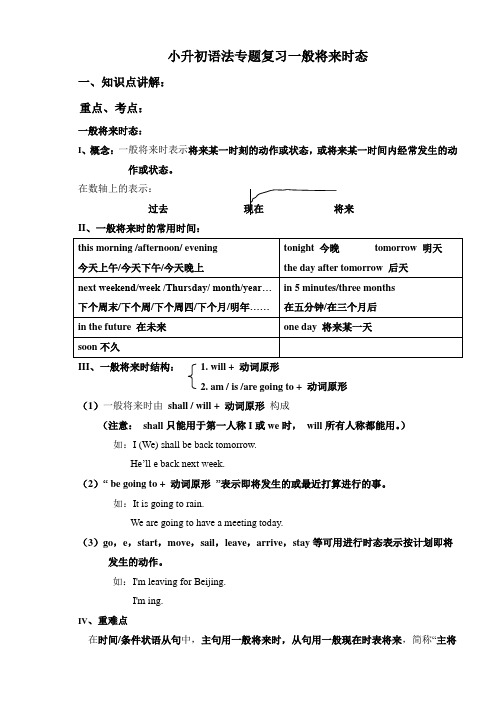
小升初语法专题复习一般将来时态一、知识点讲解:重点、考点:一般将来时态:I 、概念:一般将来时表示将来某一时刻的动作或状态,或将来某一时间内经常发生的动作或状态。
在数轴上的表示:过去现在 将来II 、一般将来时的常用时间:III 、一般将来时结构: 1. will + 动词原形2. am / is /are going to + 动词原形(1)一般将来时由 shall / will + 动词原形 构成(注意: shall 只能用于第一人称I 或we 时, will 所有人称都能用。
) 如:I (We) shall be back tomorrow.He’ll e back next week.(2)“ be going to + 动词原形 ”表示即将发生的或最近打算进行的事。
如:It is going to rain.We are going to have a meeting today.(3)go ,e ,start ,move ,sail ,leave ,arrive ,stay 等可用进行时态表示按计划即将发生的动作。
如:I'm leaving for Beijing.I'm ing.IV 、重难点在时间/条件状语从句中,主句用一般将来时,从句用一般现在时表将来,简称“主将从现”;常见的从句引导词为:when、if 、as soon as 等。
如:If it ________( not rain) tomorrow , we ________(go) to the park.I ________(be) a doctor when I ________(grow) up.I ________ (call) you as soon as he ________(e) back.V、一般将来时态与句型(**)(1)变为否定句:在be动词(am, is, are)后加not,或情态动词will后加not成won’t。
一般将来时(课件)人教PEP版英语六年级下册

变疑问很简单, will提到主语前, 变否定也不难, will后要把not添。
Example
Tomorrow will be April Fool’s Day. 明天是愚人节。
I will go to visit him next week.
下周我将去拜访他。
He will be twenty years old next year. 明年他就二十岁了。
5.— 明天她会去图书馆吗? — 不,她不会。 — __W__il_l _____ she go to the library tomorrow? — No, she _w__o_n_'_t ____.
一般将来时的用法:
时间标志
tomorrow 明天 soon 不久 next day 下一天 next week 下周 next month 下个月 next year 明年
未来发生事 I will go to the beach with my classmates next week. 下星期我要和同学去海滩。 They will have a picnic tomorrow. 他们明天要举行野餐。
It’s very cold. I think it is going to snow. 天气很冷,我想要下雪了。
I’m going to go fishing tomorrow. 我明天去钓鱼。
I’m going to tell you about it. 我打算告诉你这件事。
Tomorrow will be April Fool’s Day. 明天是愚人节。
一般 疑问句
难点解析
2. 表示时间、日程上所安排好 将要发生的事,用一般现在时。
School finishes on January 18th. 学期一月十八日结束。 The party starts at four thirty. 晚会四点半开始。
一般将来时(课件)人教PEP版英语六年级下册

时间状语
tomorrow 系列: tomorrow morning tomorrow afternoon tomorrow evening the day after tomorrow at 7:00 tomorrow morning
next 系列:
next time
next day
next week
A. are going B. are going to C. is going to
( C )3. We are going to cook some fish _____.
A. yesterday
B. last night
C. next weekend
( A )4. _____ you _____ TV every day?
A. Do; watch
B. Are; watching
C. Did; watch
( B )5. He _____ films tomorrow evening.
A. is watching B. is going to watch
C. watched
( C )6. Look!The girls _____ on the bridge over there.
一、一般将来时的用法 一般将来时表示将来某一时刻的动作或状态,或将来某一段 时间内要发生的动作或事情。 时间标志词:this afternoon, this evening, tomorrow, tomorrow+ 时间, the day after tomorrow, next+time/day/week/year … 等。 如: It is going to rain tomorrow. 明天将会下雨。
PEP六年级英语下册小学时态总复习 (2)

(+其它). I am not watching TV now.
一般疑问句:Be(Am,Is,Are)+主语+动词-ing (+其它)? Are you watching TV now?
根据图画利用所学的现在进行时造句。
3.一般现在时的构成(基本结构)
一般现在时分为 be 动词的一般现在时
和实义动词的一般现在时。 ①be动词: 陈述句/肯定句:主语+be(am,is,are)+其它.
I am a student. 否定句:主语+ be(am,is,are)+not +其它.
I am not a student. 一般疑问句:Be(Am,Is,Are) +主语+其它?
生的动作,强调“此时此刻”。
2、标志词: now现在
look!看
listen!听
They are playing football now.
Listen! She is singing a song.
3.现在进行时的构成(基本结构)
be(am,is,are)+动词-ing 肯定句:主语 + be + 动词-ing (+其它).
they go shopping every Sunday
They go shopping every Sunday. They don't go shopping every Sunday. Do they go shopping every Sunday?
一般将来时(课件)六年下册英语人教PEP版

四、按要求完成下列各题。 1.She is going to take a trip next weekend.(对画线部分提问)
What is she going to do next weekend?
2.Oliver is going to visit me next week.(改为否定句) Oliver isn’t going to visit me next week.
— Will you meet at the bus stop at 10:30?
— No , we won’t .
5.She is going to listen to music after school. (改为一般疑问句,并作 否定回答)
— Is she going to listen to music after school?
(My parents and I, take a trip, this summer holiday) 2. He is going to/will go to the bookstore next Saturday.
(he, bookstore, next Saturday) 3. My father is going to/will go hiking tomorrow.
C.will take a trip
( C )3.It
rainy tomorrow.
A.is going
B.is going to
C.is going to be
( B )4.He
visit his grandparents this evening.
A.goes to
B.is going to
六年级下册英语课件:期末复习-语法(时态 二)-人教PEP版

THANK YOU
期末复习 时态(二)
你能判断出下面句子的时态吗? 1. I went to the park yesterday. 2. I am going to relax tomorrow.
一般将来时
时态
概念
一般将来时表示将要发生的动作或存在的状态。 We are going to play football this weekend. I will get something to eat. She’s going to go to bed at nine. I’m going to have a picnic this afternoon.
构成
1.主语+be going to+动词原形+其他. 2.主语+will+动词原形+其他.
标志词
tomorrow next day/week/month/year soon the day after tomorrow (后天)
一般过去时
时态
概念
一般过去式表示过去某个时间里发生的动 作或状态。
She was a teacher. 她过去是一名老师。
讲故事时用一般过去时
Long long ago, there was a tiger in the forest. 很久很久以前,森林里有一只老虎。
考考你!
一、单项选择
( B )1.________ you ________ your grandparents last
D.will to visit
二、用所给词的正确形式填空
1.I _s_a_w____(see) a film yesterday. 2.Yesterday my mum _c_a_m__e__(come) to our school. 3.I __d_i_d____(do) not go swimming last weekend. 4.We __a_r_e_w_gi_oll_in_w_ga_st_oh__w_a__sh___(wash) my clothes soon.
六年级下册unit 2知识点
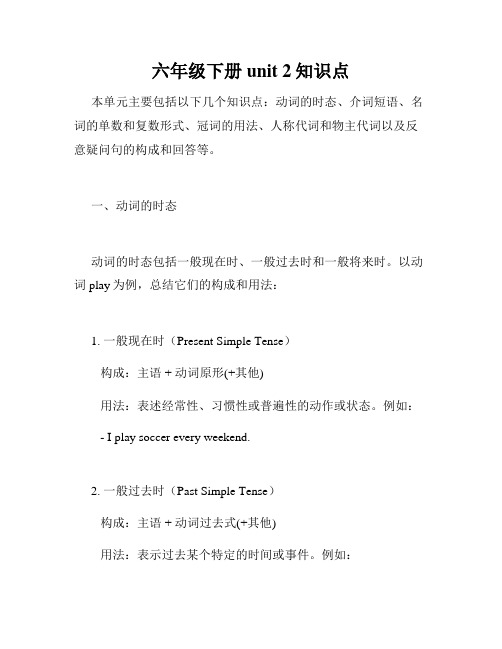
六年级下册unit 2知识点本单元主要包括以下几个知识点:动词的时态、介词短语、名词的单数和复数形式、冠词的用法、人称代词和物主代词以及反意疑问句的构成和回答等。
一、动词的时态动词的时态包括一般现在时、一般过去时和一般将来时。
以动词play为例,总结它们的构成和用法:1. 一般现在时(Present Simple Tense)构成:主语 + 动词原形(+其他)用法:表述经常性、习惯性或普遍性的动作或状态。
例如: - I play soccer every weekend.2. 一般过去时(Past Simple Tense)构成:主语 + 动词过去式(+其他)用法:表示过去某个特定的时间或事件。
例如:- She played tennis yesterday.3. 一般将来时(Future Simple Tense)构成:主语 + will + 动词原形(+其他)用法:表示将来发生的动作或状态。
例如:- They will play basketball tomorrow.二、介词短语介词短语在句子中作状语,用于修饰动词或形容词。
常见的介词短语有in front of、next to、on the left/right、under、behind等。
例如:- The book is on the table.三、名词的单数和复数形式1. 一般情况下,名词的复数形式在词尾加-s,例如:books、teachers、desks等。
2. 以s、x、sh、ch或o结尾的名词,在词尾加-es构成复数形式,例如:buses、boxes、brushes、watches等。
3. 以辅音字母+y结尾的名词,变y为i,再加-es构成复数形式,例如:ladies、berries、cities等。
4. 一些名词的复数形式不规则,例如:children、mice、feet等。
四、冠词的用法冠词分为定冠词(the)和不定冠词(a/an)。
一般将来时(讲义)人教PEP版英语六年级下册

英语学科辅导讲义
一般将来时
1.一般将来时的定义:表示将来某一时刻的动作或状态,或将来某一段时间内经常的动作或状态
2.时间标志词:
1)tomorrow, the day after tomorrow, tomorrow morning/afternoon/evening
2)next year/week/month/hour/day/century the year after next(后年)
3)in+一段时间(★★★★★)
4)in the future
5)this afternoon/Sunday/evening
6)from now on
7)one day, someday (未来的)某天
8 )soon (★★★★★)
3.结构
主语+shall/will+ do+其他(shall用于第一人称I/we)客观上将要
主语+be going to do 人作主语,打算做某事、推测天气
主语+ be going to + do+其他
这种结构常用来表达事先考虑过打算要做的事以及已有迹象表明必将要发生的某事,意为“打算;就要”。
注意:be 动词要与主语的人称和数一致
如:I am going to read some books tomorrow.
Look! It's going to rain.
★使用be going to 结构应注意的两点
There be 句型的be going to 结构为:There is going to be... (注意句型中going to 后面的be 不能改为。
新人教PEP版小学六年级英语下册Unit2Period4 PartB优质教案

新人教PEP版小学六年级英语下册 Unit 2 Period 4 Part B 优质教案教学内容本节课为新人教PEP版小学六年级英语下册 Unit 2 Period 4Part B。
教学内容主要围绕“一般将来时”的用法,通过学习本节课,学生将能够理解并运用一般将来时描述未来的计划、打算和预测。
教学目标1. 知识目标:学生能够理解并运用一般将来时描述未来的计划、打算和预测。
2. 技能目标:学生能够运用一般将来时进行简单的口语交流和写作练习。
3. 情感目标:培养学生积极向上的生活态度,激发他们对未来的憧憬和规划。
教学难点1. 一般将来时的构成和用法。
2. 描述未来计划的口语表达和写作技巧。
3. 对未来计划的思考和预测能力。
教具学具准备1. 多媒体设备:用于展示课件和教学视频。
2. 教学卡片:用于展示和练习重点句型。
3. 学生练习册:用于课堂练习和课后作业。
4. 黑板和粉笔:用于板书设计和展示。
教学过程1. 导入:通过展示一张未来的城市规划图,引发学生对未来的思考和讨论,导入本节课的主题。
2. 呈现:通过多媒体展示一般将来时的构成和用法,讲解重点句型和语法规则。
3. 练习:学生通过听、说、读、写的练习,巩固一般将来时的用法和口语表达。
4. 应用:学生进行小组活动,讨论并分享自己的未来计划,运用一般将来时进行口语交流。
板书设计1. 新人教PEP版小学六年级英语下册 Unit 2 Period 4 Part B2. 重点句型:一般将来时的构成和用法。
3. 口语表达:描述未来计划的口语表达和写作技巧。
4. 练习和活动:学生练习和小组活动的安排。
作业设计1. 书面作业:学生完成练习册中与本节课相关的内容,巩固一般将来时的用法。
2. 口语作业:学生与家长或朋友进行口语交流,分享自己的未来计划,运用一般将来时进行表达。
课后反思本节课通过多媒体展示、口语练习和小组活动等多种教学手段,帮助学生理解和运用一般将来时描述未来的计划、打算和预测。
一般将来时(课件)人教PEP版英语六年级下册

D. is; will be( )
4D. There ________ a dolphin show in the zoo tomorrow evening. A. was
B. is going to have C. will have
D. is going to be( ) 5. –
________ you ________ free tomorrow? – No. I ________ free the day
变疑问 Is she going to dance tomorrow night?
Yes, she is. No, she isn't.
否定 主+am/is/are+not going to do + 其他.
疑问
Am/ Is/ Are+主+going to do +其他? Yes, 主语 + be. No, 主语 + be not.
含will的一般将来时结构
They will climb the mountain next week. 变否定 They won't climb the mountain next week.
变疑问
Will they climb the mountain next week?
Yes, they will. No, they won't.
小学六年级下册英语小升初时态课件(通用版) 一般将来时2

He and his mother will go swimming tomorrow. He and his mother won’t go swimming tomorrow. Will he and his mother go swimming tomorrow? Yes, they will./No, they won’t.
❖ 一般将来时的句式变化 ❖ 问:Be + 主 + going to+ 动词原形 + 其他? ❖ Will + 主 + 动词原形 + 其他?
Are you going to play football tomorrow? Will you play football tomorrow?
❖ 答:Yes, 主 be. / No, 主 be not. ❖ Yes, 主 will. / No, 主 will not/won’t.
肯否回答:Yes, 主语+will. No, 主语+won't.
I will ride my skateboard next week.
I won’t ride my skateboard next week.
Will you ride your skateboard next week?
Yes, I will.
What are you going to do tomorrow? I am going to go to the cinema tomorrow.
go shopping
What is she going to do tomorrow? She is going to go shopping tomorrow.
go to bed
一般将来时
一般将来时的功能
1.表示将要发生的事情。
时态之一般将来时(课件)人教PEP版英语六年级下册

there be句型遇上一般将来时
(1)含be going to的there be句型 其结构是“There be going to be+主语+其他.”,意为“将会有……”, 其中to后的be是there be句式中的be,不能用have()。
今晚将会有一场英文电影。 There is going to have an English film this evening. () There is going to be an English film this evening. ()
2. 时间标志词:
3.基本结构: be going to+动词原形 will +动词原形
the day after tomorrow(后天) tonight(今晚)
this evening(今天晚上), this afternoon(今天下午)
tomorrow(明天),
tomorrow+时间
next+时间 下一个……
小熊同学
对划线部分提问技巧四步曲:一变二代三换四抄 1. 将句子变为一般疑问句 2. 找特殊疑问词代替划线部分(若划线部分是动词,则要加上do/doing) 3. 把特殊疑问词换到句首 4. 其它部分抄下来
1. I am going to draw pictures with Tom next week.(对划线部分提问) ________ are you _________ __________ _________ with Jack?
He will visit his grandparents next weekend.
明天我打算去打篮球。
I will play basketball tomorrow.
一般将来时(课件)人教PEP版英语六年级下册
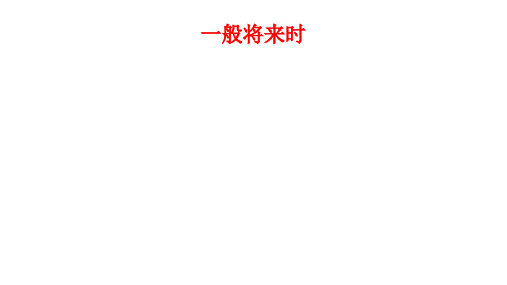
一、单项选择。
一般将来时综合训练
( C )1. (长春市) I’m going to
a horse tomorrow.
A. draws
B. drawing
C. draw
( C )2. (揭阳市普宁市) I
the moon in the future.
A. visit
B. visited
( B )3. (揭阳市普宁市) I
真题点拨
( ) ( 2022·海 南 藏 族 自 治 州 共 和 县 ) We are
a
farewell party next Saturday evening.
A. going to be
B. going to have
C. will have
【解析】考查一般将来时。句意:下周六晚上我们将举行告别晚 会。根据句中“next Saturday evening(下周六晚上)”可知,句子时态 是一般将来时,结构为be going to do或will do。举行告别晚会have a farewell party。选项B符合题意,故选B。
week/year,in the future等表示 They will be free this evening.
将来的时间状语连用。
他们今天晚上将有空。
用法
例句
He’s going to Beijing tomorrow. 表示打算、计划或 他打算明天去北京。
决定要做的事情。 We are going to meet at the school gate. 我们打算在学校门口碰头。
—Shall we go to the library on foot? 我们步行去图书馆好吗?
人教PEP版英语六年级下册 语法专题:一般将来时

一般将来时定义:一般将来时表示在现在看来即将要发生的动作或存在的状态。
常用时间副词tomorrow, soon或短语next year / week / month, in a few days, in the future, sometime 做状语。
如:What will you do this afternoon?你今天下午干什么?We will have a meeting tomorrow. 我们明天要开会。
用法及构成:1.一般将来时的基本用法是表示单纯的将来事实,由“will + 动词原形”构成:①We will have a lot of rain next month. 下个月将下很多雨。
②I think she will pass the exam. 我想他考试会及格的。
2.用“be going to+动词原形”表示。
主要表示打算和预测:①We are not going to stay there long. 我们不准备在那里多待。
(表打算)②I’m afraid they’re going to lose the game. 恐怕他们会赛输。
(表预测)③Look, it’s going to rain. 瞧,要下雨了。
(表预见)练习题:( ) 1. There __________ a meeting tomorrow afternoon.A. will be going toB. will going to beC. is going to beD. will go to be( ) 2. Charlie ________ here next month.A.isn’t workingB. doesn’t workingC. isn’t going to workingD. won’t work ( ) 3. He ________ very busy this week, he ________ free next week.A. will be; isB. is; isC. will be; will beD. is; will be( ) 4. There ________ a dolphin show in the zoo tomorrow evening.A. wasB. is going to haveC. will haveD. is going to be ( ) 5. –_____ you _____ free tomorrow?– No. I ______ free the day after tomorrow.A. Are; going to; willB. Are; going to be; willC. Are; going to; will beD. Are; going to be; will be( )6. Mother ________ me a nice present on my next birthday.A.will givesB. will giveC. givesD. Give( )7. – Shall I buy a cup of tea for you?–________. (不,不要。
六年级下册PEP_一般将来时 2总复习
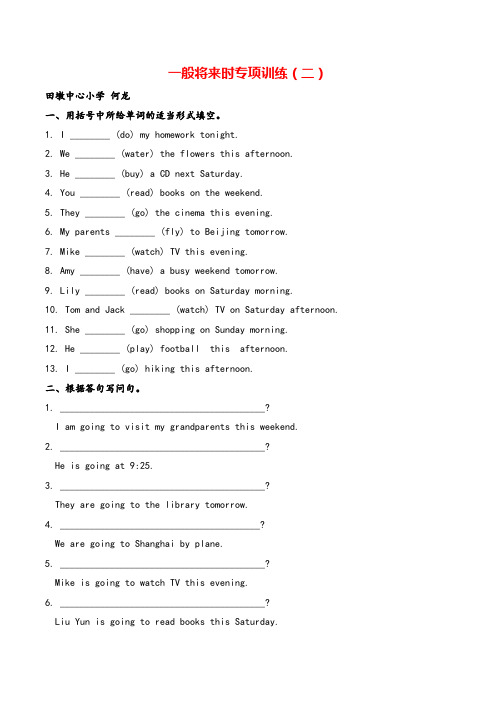
一般将来时专项训练(二)田墩中心小学何龙一、用括号中所给单词的适当形式填空。
1. I ________ (do) my homework tonight.2. We ________ (water) the flowers this afternoon.3. He ________ (buy) a CD next Saturday.4. You ________ (read) books on the weekend.5. They ________ (go) the cinema this evening.6. My parents ________ (fly) to Beijing tomorrow.7. Mike ________ (watch) TV this evening.8. Amy ________ (have) a busy weekend tomorrow.9. Lily ________ (read) books on Saturday morning.10. Tom and Jack ________ (watch) TV on Saturday afternoon.11. She ________ (go) shopping on Sunday morning.12. He ________ (play) football this afternoon.13. I ________ (go) hiking this afternoon.二、根据答句写问句。
1. _________________________________________?I am going to visit my grandparents this weekend.2. _________________________________________?He is going at 9:25.3. _________________________________________?They are going to the library tomorrow.4. ________________________________________?We are going to Shanghai by plane.5. _________________________________________?Mike is going to watch TV this evening.6. _________________________________________?Liu Yun is going to read books this Saturday.7. ________________________________________?John is going to the theme park this weekend.8. _________________________________________?Sarah is going to be an English teacher one day.三、选词填空。
Therebe句型的一般将来时(讲义)人教PEP版英语六年级下册

There be句型的一般将来时一.定义:表示某地将有什么事情发生,一般与表示将来的时间连用,如tomorrow,tonight,next等。
意为“这儿将(没)有......”。
二.There be 句型的一般将来时的结构:(1)肯定句:① There is going to be + 其他① There will be + 其他【注意】这里的be永远不变,不可以改成is, am, are; 更不可以改为have.eg: There is going to be a basketball match this weekend.=There will be a basketball match this weekend.这个周末,这儿将有一场篮球比赛。
There is going to be an English test tomorrow.= There will be an English test tomorrow.明天将有一场英语考试。
(2)否定句:① There is + not + going to be + 其他(在is后面直接加not, 其他不变)① There will + not + be + 其他(在will 后面直接加not,其他不变) (will not = won’t)eg: There isn’t going to be a basketball match this weekend.=There won’t be a basketball match this weekend.这个周末,这儿将没有一场篮球比赛。
There isn’t going to be an English test tomorrow.= There won’t be an English test tomorrow.明天将没有一场英语考试。
(3)一般疑问句:① Is there going to be + 其他? (直接把is提前,其他不变,句末加上问号)① Will there be + 其他? (直接把will提前,其他不变,句末加上问号)eg: Is there going to be a basketball match this weekend?= Will there be a basketball match this weekend?( 这个周末将有一场篮球比赛吗?)Is there going to be an English test tomorrow?= Will there be an English test tomorrow?( 明天将有英语考试吗?)翻译下列句子.1.明天将有一场演唱会._________ __________ ____________ a concert(音乐会)__________._________ _________ __________ __________ ___________a concert(音乐会)__________.2.这儿将有一个好消息给你。
人教版六年级《一般将来时》

一般将来时怎么构成?
be going to+动词原形 +将来时间 (注意使用be动词的正确形式)
用所给动词的正确形式填空
1.I am going to do (do) my homework tonight.
2.We are going to water (water) the flowers this afternoon. 3.He is going to buy (buy) a CD next Saturday.
人教版PEP英语六年级下册
什么是一般将来时?
将要发生的动作和状态.
For example
He is going to go there today. 今天他将要去那里。 We are going to (go to ) SuZhou y are going to buy some magazines tomorrow . 明天他们打算买一些杂志。 I am going to play football after school. 放学后我打算踢足球。
4.Youare going to read(read) books on the weekend. 5.They are going to (go) the cinema this evening. 6.My parents are going to fly (fly) to Beijing tomorrow.
- 1、下载文档前请自行甄别文档内容的完整性,平台不提供额外的编辑、内容补充、找答案等附加服务。
- 2、"仅部分预览"的文档,不可在线预览部分如存在完整性等问题,可反馈申请退款(可完整预览的文档不适用该条件!)。
- 3、如文档侵犯您的权益,请联系客服反馈,我们会尽快为您处理(人工客服工作时间:9:00-18:30)。
人称主语: 单数 第一人称: I 第二人称: you 第三人称:he/she/it/人名
复数 we you they
be 动词: am (与第一人称搭配) are (与第二人称或所有复数主语) is (与第三人称或者所有单数主语)
请大家翻译以下句子: 1、我打算买一本故事书。 I am going to buy a story book. 2、他明天要去旅游。 He is going to take a trip tomorrow. 3、Amy 打算今晚看电视。 Amy is going to watchTV tonight .
4、John 和Mike 打算周末去种树。 John and Mike are goingtoplant trees. on the weekend. 5、他们明天要去爬山。They are going to climb mountains _______ tomorrow.
选词填空 Amy is going to 1 a busy weekend. She is 2 to read books on Saturday morning. She is going to 3 TV on Saturday afternoon.She is going to go 4 on Sunday morning. She is going to the cinema on Sunday afternoon.She 5 be happy.
总结注意小点: 1、be going to 是将来时的标志,记住别漏掉了! 2、写作文的时候要弄清楚用第几人称去写, 不同的人称用不 用相应内容的疑问词去提问。
在将来时中,要注意区分几个疑问词 的用法:
What When Where How
什么 (提问事情) 什么时候 (提问时间) 哪里 (提问地点) 怎样 (提问方式)
Where are you going on your holiday? Who are you going with? What are you going to do there? How is your family going to...? When are you going ?
一般将来时 1、定义:表示在将来时间里打算干的事情。 2、句型结构: 人称主语+ be going to + 动词原形+ 其他
例如 1、I’m going to buy some books tonight. 2、we are going to clean our classroom tomorrow. 3、She is going to go shopping . 4、John is going to play chess with Mike. 5、They are going to the cinema this evening.
A.have B. go C.watching D.watch E.shop F.shopping G.will H.going I.has
请认真观察答句,根据答句写出问句。 1\ What are you going to do tomorrow? __________________________________ We are going to take a trip tomorrow. 2\ __________________________________ What is Sarah going to buy? Sarah is going to buy a comic book . Where are they going this evening? 3\ __________________________________ They are going to the cinema this evening. When is Mike going to the park? 4\ __________________________________ Mike is going to the park next week. How are you going to the zoo? 5\ __________________________________ I’m going to the zoo by bike. 6\Are you going to read books tonight? _________________________________ Yes, I am going to read books tonight. 7\Is she going to play football after school? _________________________________ No, she is going to play basketball after school. Do you go there by bus? 8\ __________________________________
